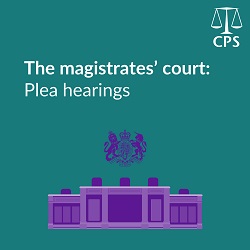If the defendant pleads ‘guilty’ to some of the charges but ‘not guilty’ to others, the CPS prosecutor will have to decide whether or not to accept the ‘guilty’ pleas.
They also need to decide what action to take on the charges to which the defendant has pleaded ‘not guilty’.
The prosecutor has two options:
1. They can either ‘offer no evidence’ for the charges to which the defendant has pleaded ‘not guilty’. If we offer no evidence this means that the court will record a ‘not guilty’ verdict for those charges and we cannot take further action on them. The District Judge or magistrates will then sentence the defendant only for the charges to which the defendant has pleaded ‘guilty’.
Or
2. They can ask for the charges to which the defendant has pleaded ‘not guilty’ be listed for trial. The defendant won’t be sentenced for any charges until after the trial has happened.
To make this decision the prosecutor has to consider a number of factors which are set out in the Code for Crown Prosecutors and the Attorney General’s guidance on accepting pleas.
This includes whether the court would be able to give the defendant a sentence that reflects the seriousness of the crimes we have charged them with. For example, if a defendant pleaded ‘guilty’ to a more minor offence like theft but ‘not guilty’ to a more serious offence like rape then the sentence the court could give them would not reflect the seriousness of the crimes we charged them with. If we don’t think the court would be able to give the defendant an appropriate sentence then we will ask for the remaining charges to be listed for trial.
Where possible we will take your views as the victim into account to help us decide whether it is in the public interest to accept the plea.
